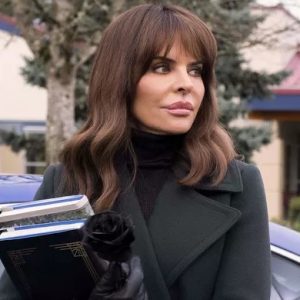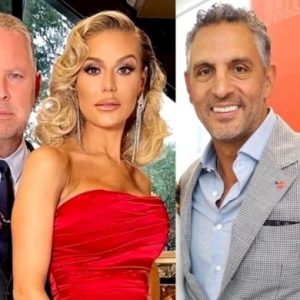In a discussion on the finale, Fear the Walking Dead’s Rubén Blades and Danay García look back on the characters and episodes that stay with them.
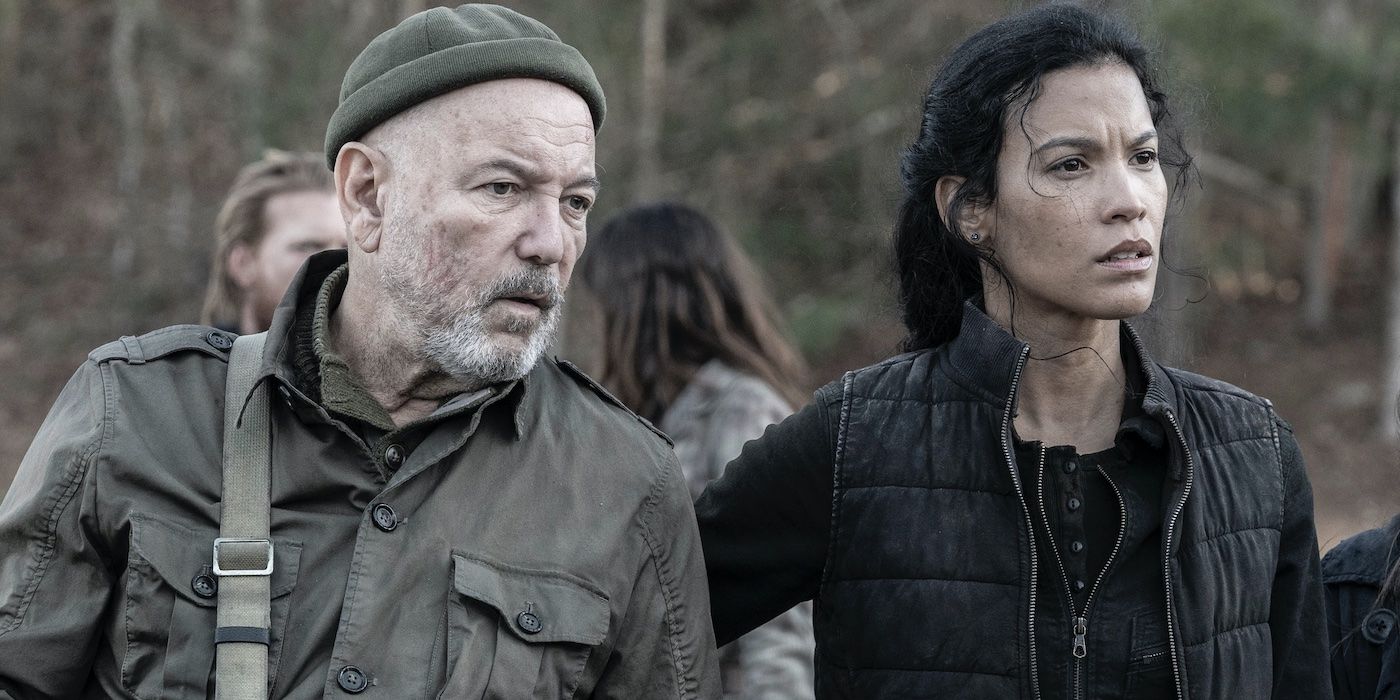
The following contains spoilers for Fear the Walking Dead Season 8, Episode 12, “The Road Ahead,” which debuted Sunday, Nov. 19 on AMC.
Fear the Walking Dead has come to an end after eight seasons of creative curveballs and reinventions. The series has experienced a revolving door of cast members, showing that no one is safe in a zombie apocalypse. But among the many that were introduced in the first two seasons of the series, only five remained: Madison Clark, Alicia Clark (who returned in the series finale), Victor Strand, Daniel Salazar, and Luciana Galvez.
Daniel and Luciana have been deeply connected to the Clark family since their introduction. Daniel saved Madison’s fiancée, Travis, from a riot in Los Angeles, and Luciana developed a romantic relationship with Nick Clark. Throughout each season, Daniel and Luciana develop a closer bond beyond the Clarks and learn to survive with each other’s company. Talking to CBR about the series finale, Rubén Blades looked back on his pride in representing the Latin community on primetime television, and Danay García reflected on the episode that stuck with her until the very end.
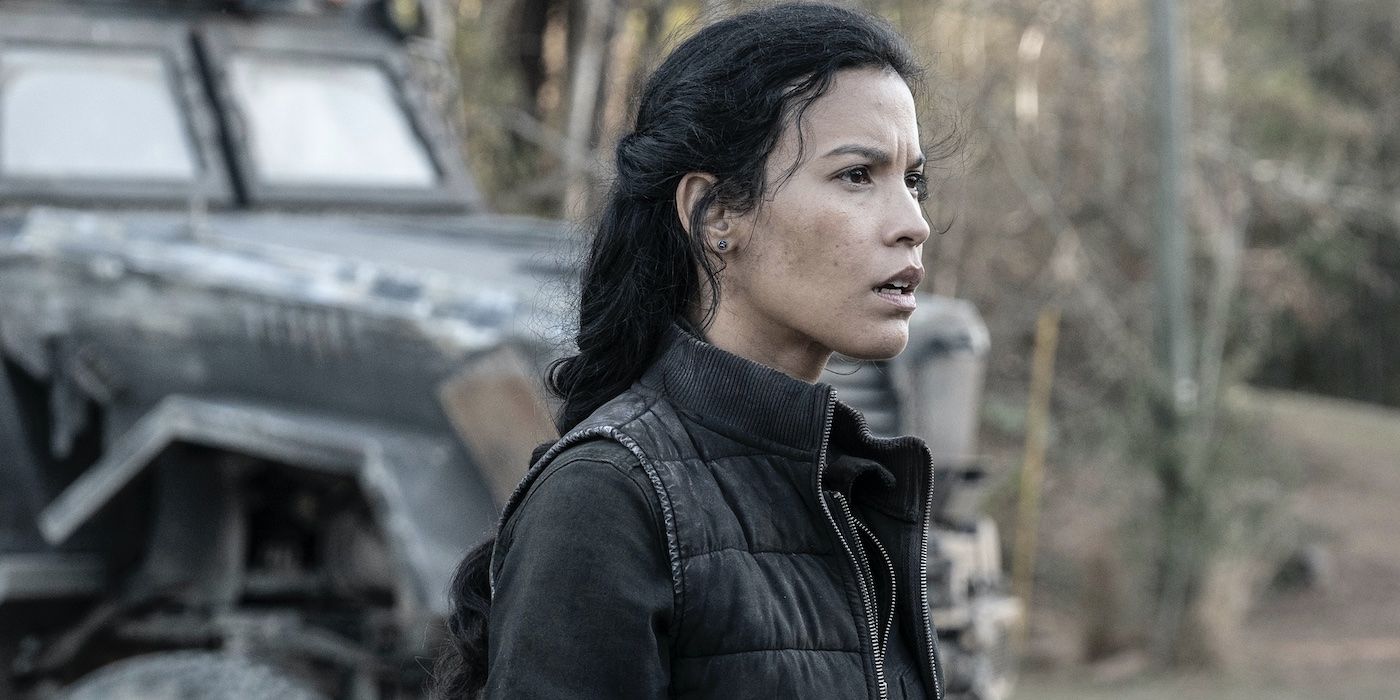
CBR: I was telling Kim Dickens and Jenna Elfman this earlier, but what a way to end the show. It’s been going on for so long. What’s been the most rewarding part about being on this show and carrying out your characters’ arcs?
Rubén Blades: For me, it was establishing the possibility of an actor to grow. The character I was interpreting has nothing to do with the way I look at the world. There was also the opportunity to think about a very serious question: What would I do if everything I know, everything that sustains what I believe, and my whole life disappeared? [What if that’s] replaced by a state of lawlessness and total collapse of society? What would I do? And the third is the friends I made. I made excellent friends and excellent connections that I will never ever forget. It was really wonderful. As a Latino actor, it was an opportunity to be on a primetime show on television in the United States when you don’t really see that many Latinos. So all of these things were what made this very special.
Danay García: Having been on a show for eight seasons… First of all, there are hardly any shows that last eight seasons. So, I think this might be our last experience to be able to live this cycle of stories and live in this universe for so long. Also, getting to know the cast and the crew throughout the years. Some of the actors left and then came back after years. It was an experience that really transforms you, and you don’t realize it until you’re done. Honestly, I’m still processing it because the show is almost finished. Everything we shot will air soon. And then that’s it. There’s no more content. We have no more scripts. I think we’re going to go through a stage of acceptance that we’re done telling our stories. We briefly spoke before that when we shot the finale, it didn’t feel like it was the finale. Everybody said it. Everybody felt the same way. It’s hard to put your mind around it because you change so much and the friendships that we created. We worked through a pandemic, and we worked through so much. It really changes you. It’s hard to let go naturally like that.
Rubén, Daniel has always been a favorite of mine. He was one of the few who was prepared for the apocalypse because of his tragic past. I particularly loved his line, “I’m tired of war.” Can you talk more about that line and his last conversation with Victor Strand?
Blades: There was a lot happening [in the finale], and you got to tie a lot of knots. I wanted to be able to say something that would get to the point and also be surprising at the same time. So, I suggested to the writers, “Can I say this last line in German?” It’s like the new life that Strand has chosen for himself. I do several things by saying that. First of all, my God, Salazar speaks German? It has everybody surprised, even at the end. They still don’t know Salazar. Salazar is a man with a lot of resources and a lot of different things hidden under his sleeve. Second, to be able to say something to Victor that would mean acceptance. Third, it would be something that would show where Salazar is at this point. He’s a man [who] thinks redemption is possible and says, “Let’s stop this. Let me just think that this is possible, although it’s hard for me to believe it. I’m going to try to believe in this.” So it’s been, “I’m tired of fighting.” And then it’s like, “All is good. I hope you do well. Just do whatever you need to do.” Thank you for noticing it.
It was such a poignant line. I’m really glad it made it in there.
Blades: I wanted Victor to think Salazar thought he could actually change. “I’m going to give you that break. I’m not going to poison your wealth. Go.”
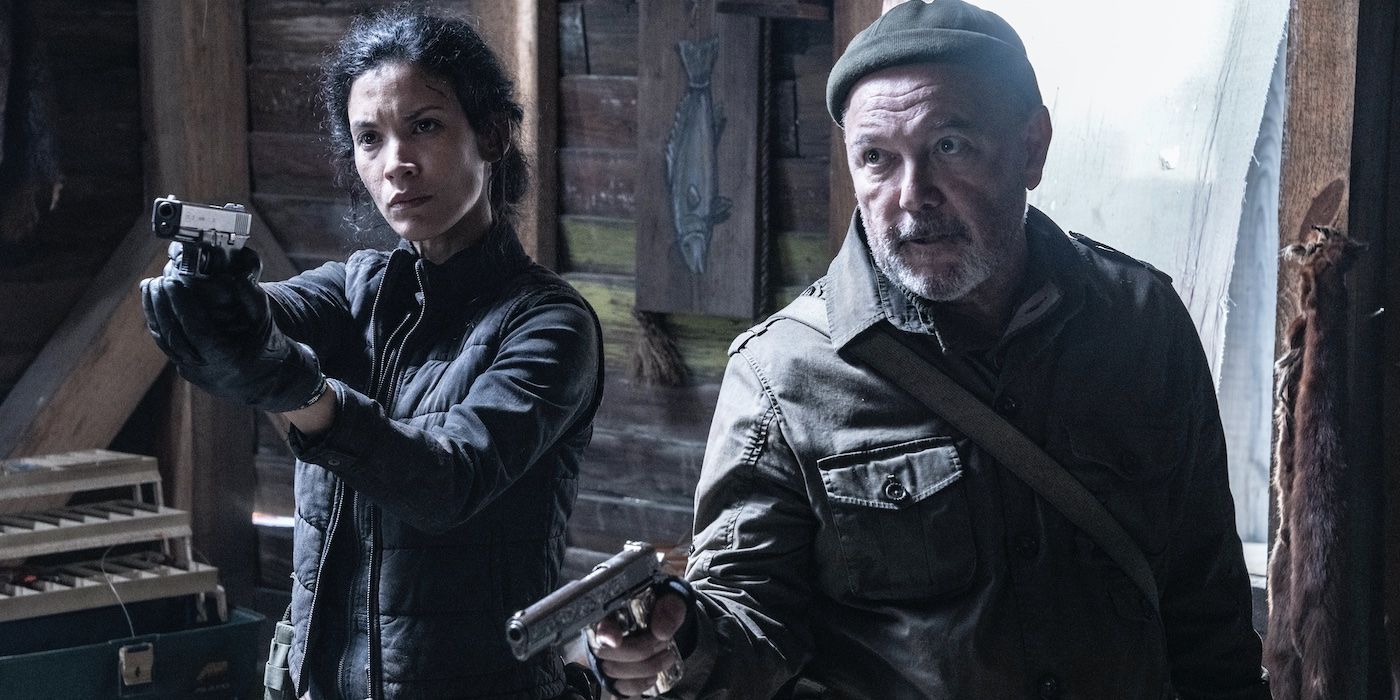
Danay, what do you think Luciana’s future has in store for her? She’s always been in service of others as a charitable person. Even in this season, she steps up and leads others, which shows her character. Will she ever do anything for herself in the future?
García: These last few episodes, she’s happy to see Madison. But at the same time, she started having limits: “You can’t stay here. You have to go.” Daniel is the one [who] interferes in this thing. Luciana forgives, but she understands how much she’s lost, and she starts finding those healthy boundaries that she has such a hard time finding throughout the story. I was happy to see that contrast in her. She can still be a good person, a tough person, but don’t cross this line because it didn’t work.
For her in the future… [laughs] you see, that’s what happens. Now we start talking about the future when the show has ended. You can’t help it. She has found a middle ground, and she’s found a friend in Salazar. She doesn’t know everything that he’s been through. But in that relationship, she understood strength in a way that she’d never been around. She’s a very strong woman, but Salazar has a different kind of strength that she was able to work around when she lied to him. I think she’s in a great place in a great team. She has a cat. She’s adopting a friend now, a cat. She’s a strong, tough cookie [who] has to toughen up with years.
Fear the Walking Dead has had so many cast members come and go throughout the years. If you could bring back any deceased character, either as a flashback or have them survive until the end, who would you choose?
Blades: I would have brought back [John] Dorie. I thought he was wonderful. The character was really interesting and had a troubled background. I would have loved to see Dorie and Salazar acting as a team. They both had a difficult background that would have made them understand each other very quickly, and also, the sense of humor that they both had in spite of their troubled pasts. That would have been a really interesting dynamic between the two of us. And he’s a solid actor.
García: Amazing, Garret [Dillahunt]. I think I would have brought back Frank [Dillane as] Nick. Watching the finale, there were flashbacks through Madison that brought back Nick and Alicia. They were really the core of our show when we started. When you’re shooting it, you don’t know what they’re going to use for the flashbacks or the images that they picked. I feel so pleasantly surprised. It made me feel like, “Oh, they’re part of this journey right now. They’re here in the image.” We can see and feel those moments, and I remember the scenes that they picked. So he actually came back in flashbacks, but I would have loved to see him in person. I would have loved for Luciana to have a visual dream [so she can] have that conversation with Nick. I felt like they never had it, and I think they deserved it.
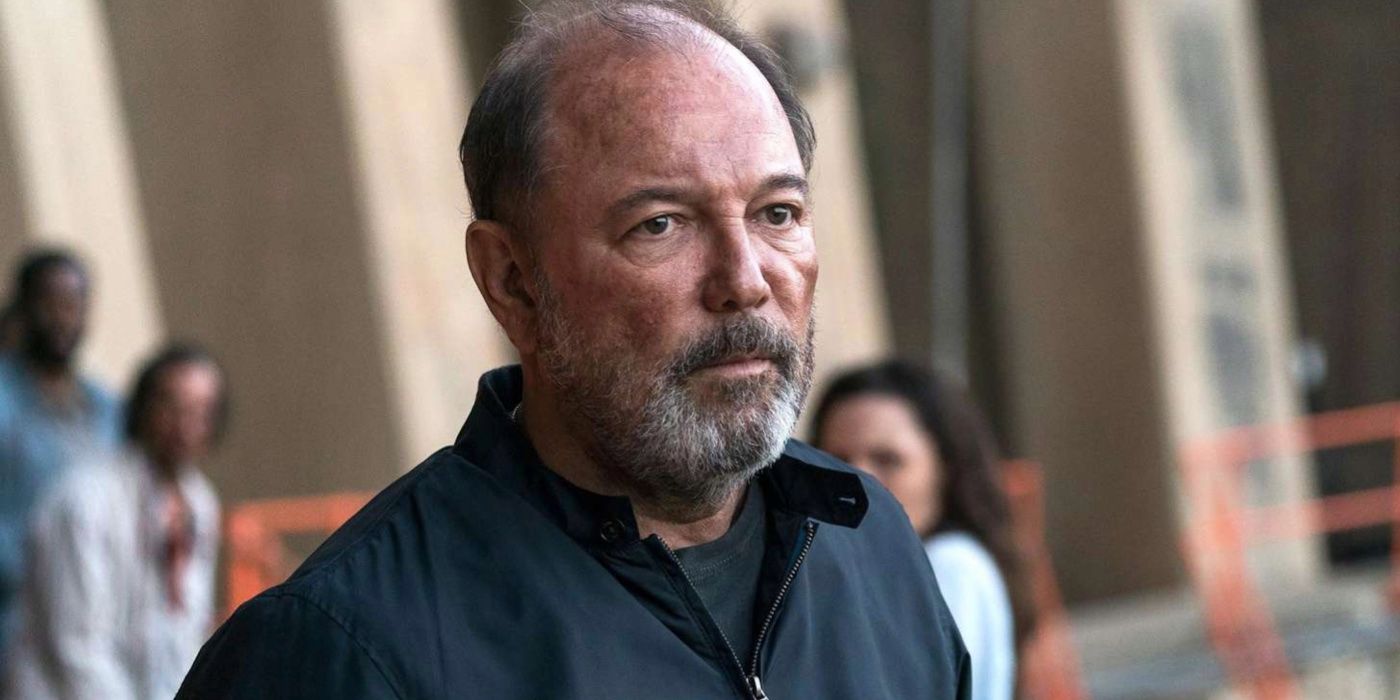
Looking back on your time on the show, was there any particular episode that was a standout to you?
Blades: For me, it was the return of Salazar in Season 3. It was well written, and Jesse Borrego and everybody that worked on it were really superb. I thought that that was a really wonderful episode. I don’t even remember if it was [Season 3, Episode 4,] “100.” When Salazar came back, that was an episode that was very interesting. It had the whole arc of Salazar.
García: And it was in Spanish.
Blades: It was in Spanish, which was wonderful in the sense that it was perhaps one of the few — if not the only — episodes that have been done in complete Spanish in primetime television’s history. It was very well received, and it got great reviews. People accepted the subtitles.
García: For me, an episode that I really loved was [Season 7, Episode 11,] “Ofelia.” I loved it because Alycia [Debnam-Carey] was the director. I got to see her behind the scenes. It was wonderful. I was able to be there for her. It was a very strong episode for Luciana in terms of dealing with Salazar for the first time. He put us in danger. We worked really hard. It was a lot of work because we had to translate things into Spanish. So, it took a lot of preparation from Rubén and me. Alycia might understand a little Spanish, but we wanted to be there for her, too, because now we’re speaking in another language. She’s directing, and it’s one of the most important episodes of that season for our characters. So we had a lot of challenges. I love the journey and how it turned out. I love seeing Alycia happy. I love seeing her grow as an artist. I love working with Rubén and going down that rabbit hole of the unknown. And then later, [the fact] that she lied to him, like, how are we going to resolve this? So it was a beautiful experience in front of the screen with Rubén and having Alycia on that side receiving everything we were doing. It felt like a nice circle since we started this in Mexico.




